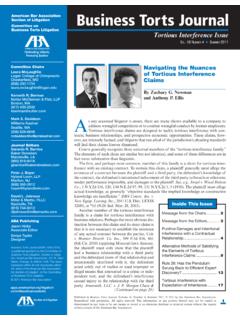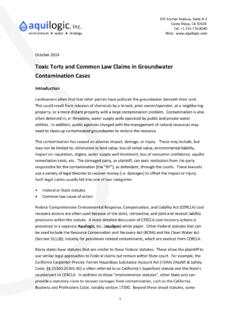Transcription of KARNATAKA STATE LAW UNIVERSITY SYLLABUS
1 KARNATAKA STATE LAW UNIVERSITY SYLLABUS . COURSES PRESCRIBED FOR 3 YEAR LL. B. DEGREE COURSE. I Semester: Course I Contract-I. Course-II Constitution Course-III Law of Torts Course-IV Family Law-I: Hindu Law Course-V Criminal Law-I: Indian Penal Code II Semester: Course-I Contract-II. Course-II Company Law Course-III Property Law Course-IV Administrative Law Course-V Family Law II: Mohammedan Law & Indian Succession Act III Semester: Course-I Environmental Law Course-II Labour Law Course-III Criminal Law-II: Criminal Procedure Code, JJ Act & Probation of Offenders Act Course-IV Jurisprudence Course-V Clinical Course-I: Professional Ethics and Professional Accounting System IV Semester: Course-I Public International Law Course-II Optional-I: Human Rights Law and Practice / Insurance Law Course-III Optional-II: Banking Law / Right to Information Course-IV Clinical Course-II: Alternative Dispute Resolution Systems V Semester: Course-I Civil Procedure Code and Limitation Act Course-II Optional-III: Intellectual Property Rights-I / Penology &.
2 Victimology Course-III Optional-IV: Interpretation of Statutes & Principles of Legislation / Competition Law Course-IV Clinical Course-III: Drafting, Pleading and Conveyance VI Semester: Course-I Law of Evidence Course-II Taxation Course-III Optional V: Intellectual Property Rights-II / White Collar Crimes Course-IV Optional VI: Women and Criminal Law & Law relating to child / International Trade Economics Course-V Clinical Course-IV: Moot Court exercise and Internship SYLLABUS PRESCRIBED FOR 3 YEAR LL. B. DEGREE COURSE. I SEMESTER: COURSE I: CONTRACT-I: GENERAL PRINCIPLES OF CONTRACTS. Objectives: Contracts are at the basis of majority of transactions especially transactions dealing with the property. Whether the transaction is in the ordinary course of life or in the electronic world (e-commerce) the general principles governing contracts remain same. For this reason it is very important to introduce the students to the basic principles governing contracts and lay a powerful foundation for their study of other transactional and related laws in higher semesters.
3 Course contents: UNIT I. History Formation of Contract Agreement and Contract Definitions Classification - Offer and Acceptance Communication Revocation Essential elements Invitation to Offer Tenders. Consideration Nudum Pactum - Essential elements Privity of Contract and of Consideration Exceptions Unlawful Consideration and its effect. Contractual Ability Electronic Documents as Web Pages Digital Certificates as Entry Passes Time and Place of Contract Secured Custody of Electronic Records. UNIT II. Capacity to Contract Minor's Agreements and its effects Persons of unsound mind . Persons disqualified by Law. Free Consent Coercion - Undue influence Misrepresentation Fraud Mistake . Legality of Object Void Agreements Agreements against Public Policy Wagering Agreements Its exceptions Contingent Contracts. UNIT III. Discharge of Contracts and its various Modes by performance Time and place of performance Performance of reciprocal promises - Appropriation of Payments . Discharge by Agreement By operation of Law By frustration (Impossibility of Performance) By Breach (Anticipatory and Actual).
4 UNIT IV. Remedies for Breach of Contracts Damages Remoteness of damages Ascertainment of damages -Injunction When granted and when refused Restitution Specific performance when granted Quasi Contracts. UNIT V. The Specific Relief Act Nature of Specific Relief Recovery of Possession of movable and immovable Property Specific performance when granted and not granted Who may obtain and against whom Discretionary remedy Power of Court to grant relief Rectification of instruments Cancellation Declaratory decrees Preventive relief Temporary injunctions Perpetual and Mandatory Injunctions. Government as a contracting party: Constitutional provisions Government powers to contract Procedural requirements Kinds of Government Contracts, their usual clauses, performance of such contract, settlement of disputes and remedies. Prescribed Books: 1. Avtar Singh- Law of Contracts 2. Avtar Singh- Specific Relief Act Reference Books: 1. Pollock & Mulla- Indian Contract Act 2. P. S. Atiya- Introduction to the Law of Contract 3.
5 G. C. Cheshire- Law of Contract 4. William Anson- Law of Contract 5. Henry Maine- Ancient Law COURSE-II: CONSTITUTION. Objectives: The purpose of the course is to acquaint the students with the Basic Postulates of the Constitution like the Constitutional Supremacy, Rule of law, and Concept of Liberty. Give them a picture of Constitutional Parameters regarding the organization, Powers and Functions of the various Organs of the Government. The emphasis is also on the study of the nature of federal structure and it's functioning. A critical analysis of the significant judicial decisions is offered to highlight judicial restraint, judicial passivity, judicial activism and judicial balancing. Finally, the students should be able to articulate their independent views over contemporary crucial constitutional issues. Course contents: UNIT-I. Salient Features of the Indian Constitution, Preamble, Citizenship, Fundamental Rights. UNIT-II. Directive Principles of STATE Policy, Fundamental Duties, Parliamentary Government, Bicameralism, Legislative Process, Privileges, Council of Ministers, President of India, Governor.
6 UNIT-III. Judicial process under the Constitution, Nature of Judicial Review, Judicial Review- , 226 and 227, Court system in India, Judges- Appointments, conditions of service, etc., Advisory Jurisdiction of the Supreme Court, Public Interest Litigation, Activism v. Restraint. UNIT-IV. Federalism, Center- STATE Relations, Freedom of Inter STATE Trade, Methods of Constitutional Amendment, Limitation on Constitutional Amendment. UNIT-V. Emergency provisions, Services under the STATE , STATE Liability. Prescribed Books: Jain - Indian Constitutional Law. Reference Books: Seervai - Constitutional Law of India (3 Volumes). Shukla - Constitution of India. Basu - Shorter Constitution of India Basu - Shorter Constitution of India. Austin Granville- The Indian Constitution: Corner Stone of a Nation COURSE-III: LAW OF TORTS. Objectives: This course is designed to study the principles of Tortious liability, the defences available in an action for torts, the capacity of parties to sue and be sued and matters connection there with.
7 Further, this course is designed to study specific torts against the individual and property. With rapid industrialization, inadequacy of the law to protect the individual is exposed. An attempt shall be accorded to the individuals against mass torts and industrial torts. Keeping in the expensive character of judicial proceedings the students should reflect on the alternative forms, and also the remedies provided under the Consumer Protection Act, 1986. Course contents: UNIT-I. Evolution of law of torts- Nature and scope of law of torts- Meaning- Torts distinguished from Contract- Crime- Development of Ubi jus ibi Remedium- Mental elements- Intention, Motive, Malice in Law and in Fact. UNIT-II. General Defences, Vicarious Liability. UNIT-III. Negligence; Nuisance; Absolute and Strict liability. Legal Remedies-Awards-Remoteness of damage. UNIT-IV. Torts against person: Torts affecting body- Assault, Battery, Mayhem and False Imprisonment; Torts affecting reputation-Libel and Slander, Torts affecting freedom- Malicious Prosecution, Malicious Civil Action and Abuse of Legal Process; Torts affecting domestic and other rights-Marital Rights, Parental Rights, Rights to Service, Contractual Rights, Intimidation and Conspiracy; Torts against property.
8 UNIT- V. Consumer Protection Act, 1986. Prescribed Books: Ratanlal and Dhirajlal- Law of Torts. Singh Gurubax- Law of Consumer Protection. Reference Books: Winfield and Jolowicz- tort . Hepple and Mathews- tort : Cases and Materials Baxi Upendra and Danda Amita- Valiant victims and Lethal Litigation-The Bhopal Case, 1990 Salmond- On Torts. Avtar Singh - The law of Torts. D. N. Saraf - Law of Consumer Protection in India. COURSE-IV: FAMILY LAW-I: HINDU LAW. Objectives: The knowledge of family laws is important for lawyers. This course is designed to endow the students with knowledge of both the codified and uncodified portions of Hindu law. The course concerns itself with the sources, schools, institutions, succession, maintenance, menace of dowry, etc. Course contents: UNIT I. Introduction - Concept of Dharma - Sources of Hindu Law Modern and Ancient - Importance of Dharma Shastra on Legislation Two Principal Schools of Hindu Law - Application of Hindu Law. UNIT II. Marriage and Kinship - Evolution of the Institution of Marriage and Family- Law Prior to Hindu Marriage Act -A detailed study of Hindu Marriage Act, 1955 -Matrimonial Remedies - Maintenance and Alimony; Customary Practices and legislative provisions relating to dowry prohibition.
9 UNIT III. Hindu undivided family Mitakshara Joint Family - Formation and Incidents - Property under both Schools Kartha: His Position, Powers, Privileges and Obligations - Debts . Doctrine of Pious Obligation - Partition and Reunion Religious and Charitable Endowment. UNIT IV. Inheritance and Succession - Historical perspective of traditional Hindu Law relating to Inheritance - A detailed study of Hindu Succession Act, 1956. Stridhana- Woman's Property - Recent STATE and Central Amendments to Hindu Succession Act; Gifts and Testamentary Succession Wills. UNIT V. Law relating to Hindu Minority and Guardianship: Kinds of Guardians; Duties & Powers of Guardians; A detailed study of Hindu Adoption and Maintenance Act, 1956;. Maintenance: Traditional Rights and Rights under Hindu Adoption & Maintenance Act 1956. Prescribed Books: Paras Diwan Modern Hindu Law Reference Books: John D. Mayne Hindu Law Usages Mulla Principles of Hindu Law Paras Diwan Law of Adoption, Ministry Guardianship's custody J.
10 D. M. Derrett Hindu Law Past and Present COURSE-V: CRIMINAL LAW-I: INDIAN PENAL CODE. Objectives: This course is designed to understand the meaning of crime, methods of controlling them and the essential principles of criminal liability by a study of a range of offences under the Indian Penal Code. Course contents: UNIT I. General Principles of Crime; Conceptions of Crime; Distinction between Crime and other wrongs under common Law Crime and morality distinction Circumstances when morality amounts to crime - STATE 's responsibility to detect, control and punish crime. Principles of criminal liability Actus reus and mens rea (also statutory offences) and other maxims; Variations in liability Mistake, intoxication, compulsion, legally abnormal persons; Possible parties to the crime: Principal in the I degree; Principal in the II degree; Accessories before the fact; Accessories after the fact. Indian Penal Code: General Explanation, Sections 6 33 and 39 52A; Punishment, Sections 53 75- social relevance of Capital Punishment - Alternatives to Capital Punishment - Discretion in awarding punishment and minimum punishment in respect of certain offences with relevance to precedents (judgments).






